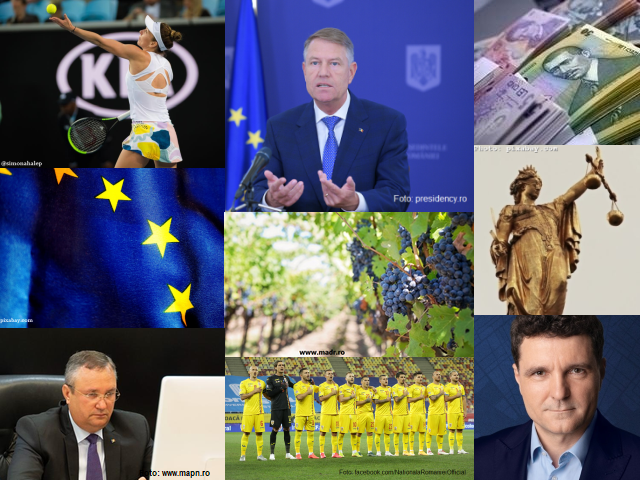THE WEEK IN REVIEW
April 11 - 15 2022

Corina Cristea, 16.04.2022, 14:15
The Support for Romania program
The PSD-PNL-UDMR ruling coalition in Romania convened on a package of economic and social measures meant to buffer the energy crisis and compensate for the rise in prices. Some of the measures have already been passed by Parliament in Bucharest. The Support for Romania plan is worth about 17 billion lei, around 3.5 billion Euro, with more than half that amount flowing from European funds. Among the most important decisions is the increase in the minimum wage in farming and the food industry, vouchers for low income earners, as well as subsidies and aid for SMEs and farmers. 300 million Euros are earmarked for compensating for rising prices, SMEs would get up to 400,000 Euros per company to stimulate investments. Transportation companies would be able to claim half a leu per liter of fuel, while farmers would be able to get grants. Other measures aim at voluntary, tax free growth in the minimum wage, doubling meals for patients in hospitals, and increasing the value of meal vouchers. According to PM Nicolae Ciuca, the package has three prongs: sustaining the economy with the aim of a healthy growth, social cohesion, and inter-generation solidarity. Almost 12 million people would benefit from the social measures of this government program, according to the authorities. Meanwhile, the National Institute of Statistics announced that the rate of inflation has reached 10.15% in March, a record figure in the last 18 years.
NATO consolidates presence on the Eastern flank
The conflict in Ukraine and the consolidation of NATOs presence on the Eastern flank have dominated the Tuesday meeting in Bucharest between President Klaus Iohannis and Belgian PM Alexander De Croo. The head of state believes NATO needs a new strategic concept, aimed to reaffirm collective defense as a fundamental priority for the alliance, stating explicitly that Russia is the main threat to security. He added that this spring NATOs combat group would be formed on Romanias territory, after finalizing negotiations between allies. In turn, the Belgian PM said that NATO is a strong alliance that Romania can rely on. He said that the two countries share a common border, as 300 Belgian military are part of the NATO response forces, activated by the North Atlantic Council on February 25, right after Moscow started the war. In March, they joined the 500 French troops already present at the Mihail Kogalniceanu Airbase 57 in southeast Romania. The base was visited this week by the Romanian head of state and the Belgian PM, joined by Romanian PM Nicolae Ciuca, who emphasized that the allies have to be prepared by a prolonged crisis, and for the eventuality that this crisis would spread closer to NATOs border.
The European Commissioner for Transport visits Bucharest
The European Commissioner for Transport, Romanian Adina Valean, visited Bucharest for two days. She took part, along with PM Nicolae Ciuca, in a conference regarding the future of Europe, organized by the EC representative in Romania. She also attended a video conference with the ministers of transportation from Romania, the Republic of Moldova, and Ukraine. PM Ciuca and Commissioner Valean convened to work closely in order to facilitate rail, road, river, and sea transportation to and from Ukraine and the Republic of Moldova, which border Romania. Nicolae Ciuca lauded the initiative by Commissioner Valean to set up a working group to find solutions for increasing the degree to which Romania absorbs European funds allocated to projects in the transportation infrastructure.
The offshore law under debate in Parliament
The bill that would bring changes to the offshore law, which regulates natural gas extraction in the Black Sea, has reached the floor of Parliament, where it will be debated under emergency procedure. This is the first modification to the first version, which did nothing but chase away investors. The governing coalition is now proposing a more balanced version, saying that it would bring advantages to the state and to companies who want to exploit the deposits. The state and Romanian companies would have priority for purchasing extracted gas, with the surplus going to exports. 60% of the profit made from natural gas extraction would go to the state, and 40% to investors. Also, the document eliminates supplementary taxation of revenue for sales that dont result in extra profit for investors. The exception is supplementary revenue as a result of applying prices higher than 85 lei per MW/hour. Another modification is eliminating a ceiling on deducting investments for the calculation of tax on revenue. Debating the emergency bill comes against the energy crisis, and the attempt to wean off Russian gas supplies. Economic analysts believe that the present proposal could stimulate investment, but, even if successful, extraction of present deposits would still take a number of years from now.





























